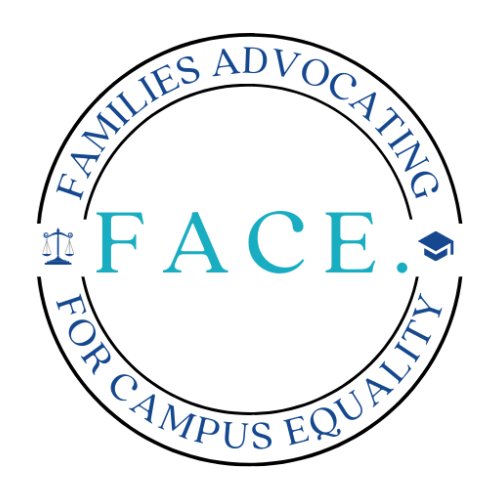Title IX
No person in the United States shall, on the basis of sex, be excluded from participation in, be denied the benefits of, or be subjected to discrimination under any education program or activity receiving Federal financial assistance… — TITLE IX 20 U.S.C. SEC. 1681. June 23, 1972
Inequitable Title IX
Many Americans are unaware that the Department of Education Office for Civil Rights (DOE/OCR) reinterpreted Title IX in 2011 and 2014 to include sexual misconduct on campuses and issued guidelines for schools to conduct private campus tribunals that investigate such allegations without the supervision of law enforcement agencies. This reinterpretation distorts Title IX into something that was never intended: a weapon against students and faculty members with unfair procedures and severe consequences.
The DOE/OCR guidance has denied important protections created over centuries based on the United States Constitution for the express purpose of ensuring accurate and reliable judgments, that is, providing the innocent are protected while punishing the guilty. Denied protections include the right to be informed of the allegations, the opportunity to be informed of and have access to all evidence (exculpatory and inculpatory), representation by an advocate (i.e., attorney), the opportunity to present evidence to unbiased decision-makers (who do not also serve as investigators or coordinators), and the opportunity to observe the accuser and other adverse witnesses respond to questions. In other words, the DOE/OCR guidelines remove one of the most well-established protections of the Constitution — the right to due process when accused of wrongdoing. This makes it almost impossible for accused individuals to defend themselves. In so doing, many Title IX campus tribunals have become a collection of inequitable procedures, producing biased, unfair, and inaccurate outcomes. As a result, in 2020, the DOE/OCR issued new guidance to restore some of the Constitutional due process protections, but the present DOE/OCR (2024) is planning to roll these protections back to 2011 standards.
Inaccurate and Unreliable
To further complicate the problem, most accused students and faculty trust that their school will treat them fairly and believe that telling the truth will result in an accurate and, therefore, reliable determination. In reality, many students and faculty have been blindsided by campus attorneys or administrators acting as advocates for the accuser, compiling only evidence to support the accuser’s narrative while ignoring or disregarding evidence that conflicts with this narrative. Furthermore, in some cases, many accused individuals have been denied access to or representation by any equally experienced defense advocate, attorney, or even a parent.
Why would campus officials conduct such biased investigations? One possible explanation is to appease the DOE/OCR and secure federal funding for the school, such as student loan money. The DOE/OCR has threatened to withhold federal funding from any school that does not follow their guidelines (which often results in inequitable Title IX procedures). With millions of federal funds on the line, schools are under tremendous pressure to comply with these guidelines and demonstrate this compliance to the DOE/OCR. To demonstrate compliance, schools may need to appear highly sympathetic to accusers by reporting rates of sexual misconduct similar to the preconceived notions of the DOE/OCR and preventing accusers from reporting unsatisfactory outcomes after filing a complaint. As a result, many campus officials may find themselves with a conflict of interest, incentivized to act in the financial interest of the school by promoting tribunal outcomes that pacify the DOE/OCR instead of working impartially to determine the truth.
As you may have concluded, these Title IX processes lack fundamental fairness and create a biased, unequal evaluation of the evidence that favors a finding of responsibility regardless of the truth. As a result of this flawed process, the accuracy of any final judgment remains questionable and, therefore, unreliable.

